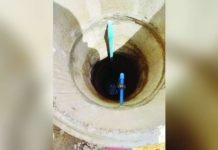
ILOILO – The Provincial Health Office (PHO) is urging the public to be wary of illnesses associated with the rainy season, especially the deadly leptospirosis. Remain vigilant despite the decrease in leptospirosis cases, according to provincial health officer 1 Maria Socorro Colmenares-Quiñon.
“Tag-ulolan damo naman ang areas kon sa diin may pagbaha. Dumdomon ta sa gihapon ang leptospirosis yara lang kay endemic ang Iloilo province for the leptospira bacteria,” said Quiñon.
Leptospirosis is caused by the leptospira bacteria that enter the body through wounds which come in contact with floodwater, vegetation and moist soil contaminated with the urine of infected animals, especially rats.
Based on PHO’s data from Jan. 1 to July 6 this year, suspected leptospirosis cases showed a 70-percent decline with only 18 cases, lower compared to last year’s 61 on the same period.
Quiñon said the decrease could be attributed to the PHO’s heightened advocacy campaign.
“Do not wade in floodwater especially when you have an open wound,” stressed Quiñon.
The municipality of Oton has the highest reported suspected leptospirosis cases with three.
The towns of Cabatuan and Santa Barbara followed with two each.
The municipalities of Dueñas, San Enrique, Miag-ao, Barotac Nuevo, San Miguel, Maasin, Leon, Tigbauan, Balasan, and Estancia also recorded one case each.
PHO’s records revealed that 14 out of 42 towns in the province, including the component city of Passi have recorded suspected leptospirosis case.
Quiñon warned farmers to avoid exposure to contaminated water.
“To those nga may exposure bisan wala sang pilas, especially our farmers, nagahatag kita sang prophylaxis sa ila para ma-prevent ang leptospirosis,” said Quiñon.
Meanwhile, 29 towns are still without recorded leptospirosis. These are Pototan, Lambunao, Alimodian, New Lucena, Concepcion, Dumangas, Badiangan, Zarraga, Dingle, Sara, Barotac Viejo, Janiuay, Banate, Carles, Mina, Leganes, Igbaras, Tubungan, Calinog, Anilao, Pavia, Lemery, Bingawan, Passi City, Guimbal, San Dionisio, Ajuy, Batad, and San Rafael.
According to the World Health Organization, the leptospira bacteria enter the body through cuts or abrasions on the skin, or through the mucous membranes of the mouth, nose and eyes. Person-to-person transmission is rare.
In the early stages of the disease, symptoms include high fever, severe headache, muscle pain, chills, redness of the eyes, abdominal pain, jaundice, hemorrhages in the skin and mucous membranes, vomiting, diarrhea, and rash.
The PHO encouraged the public to wear boots when crossing floodwaters, and not to wade in waters if their feet have open wounds./PN



